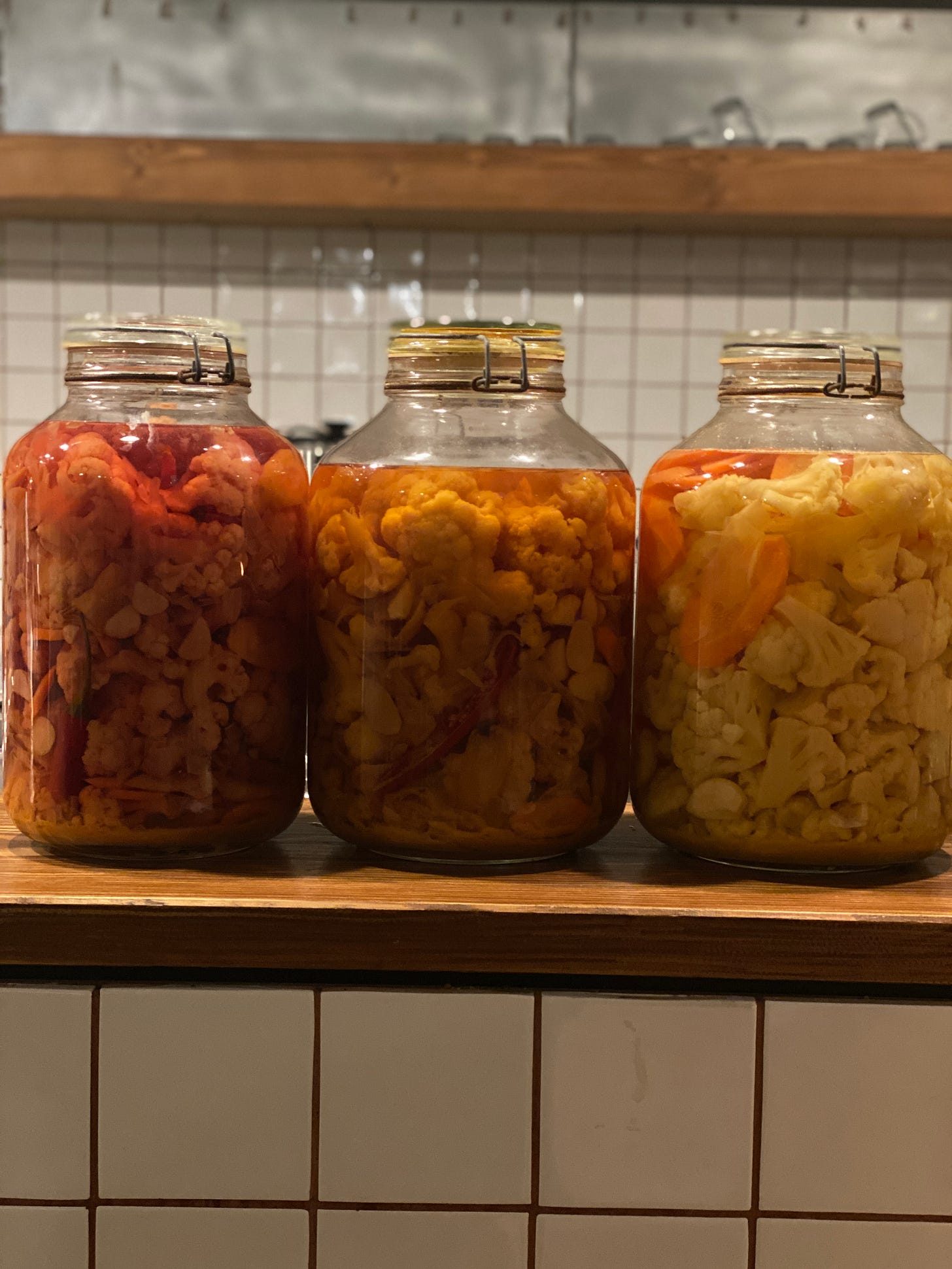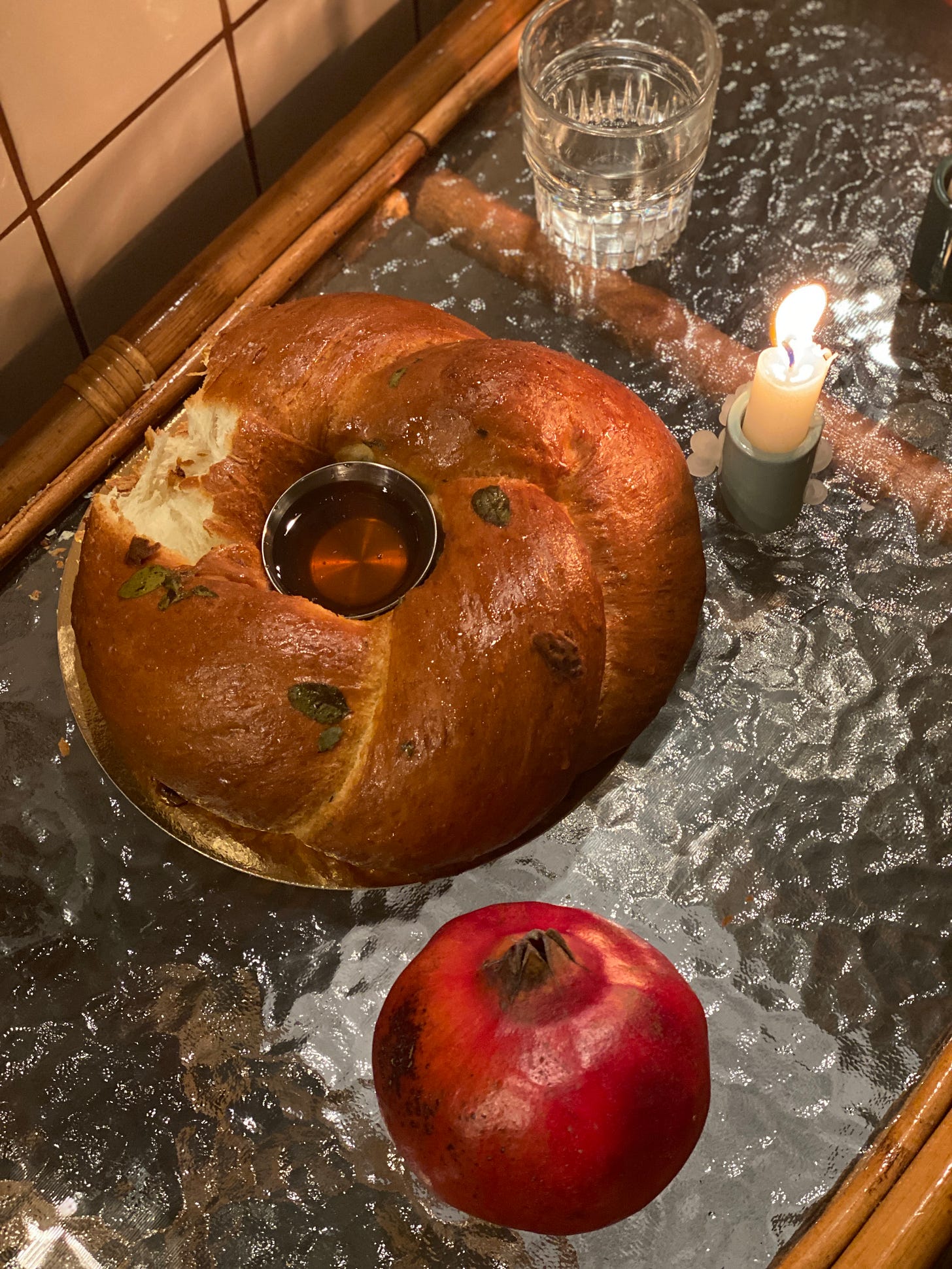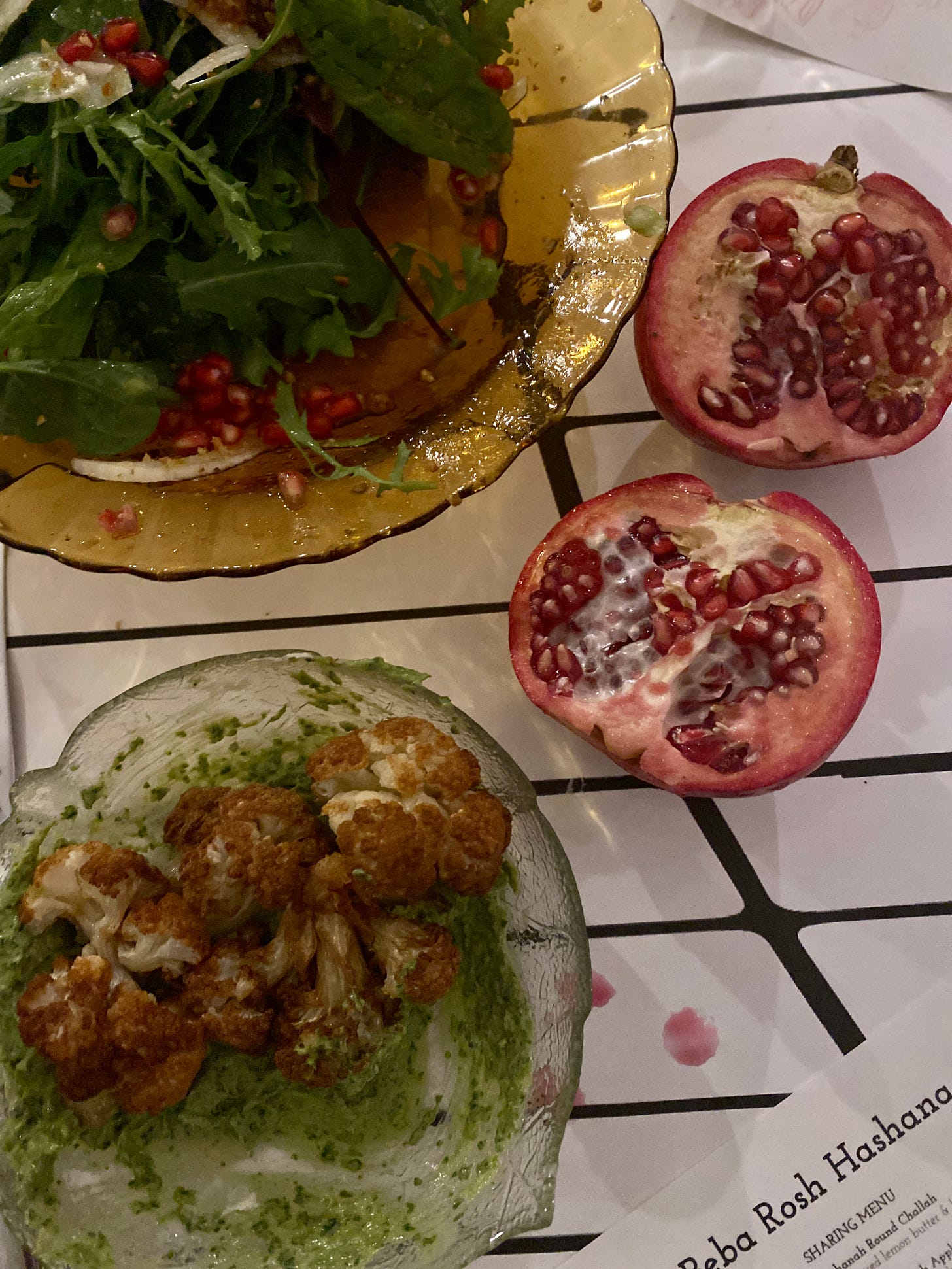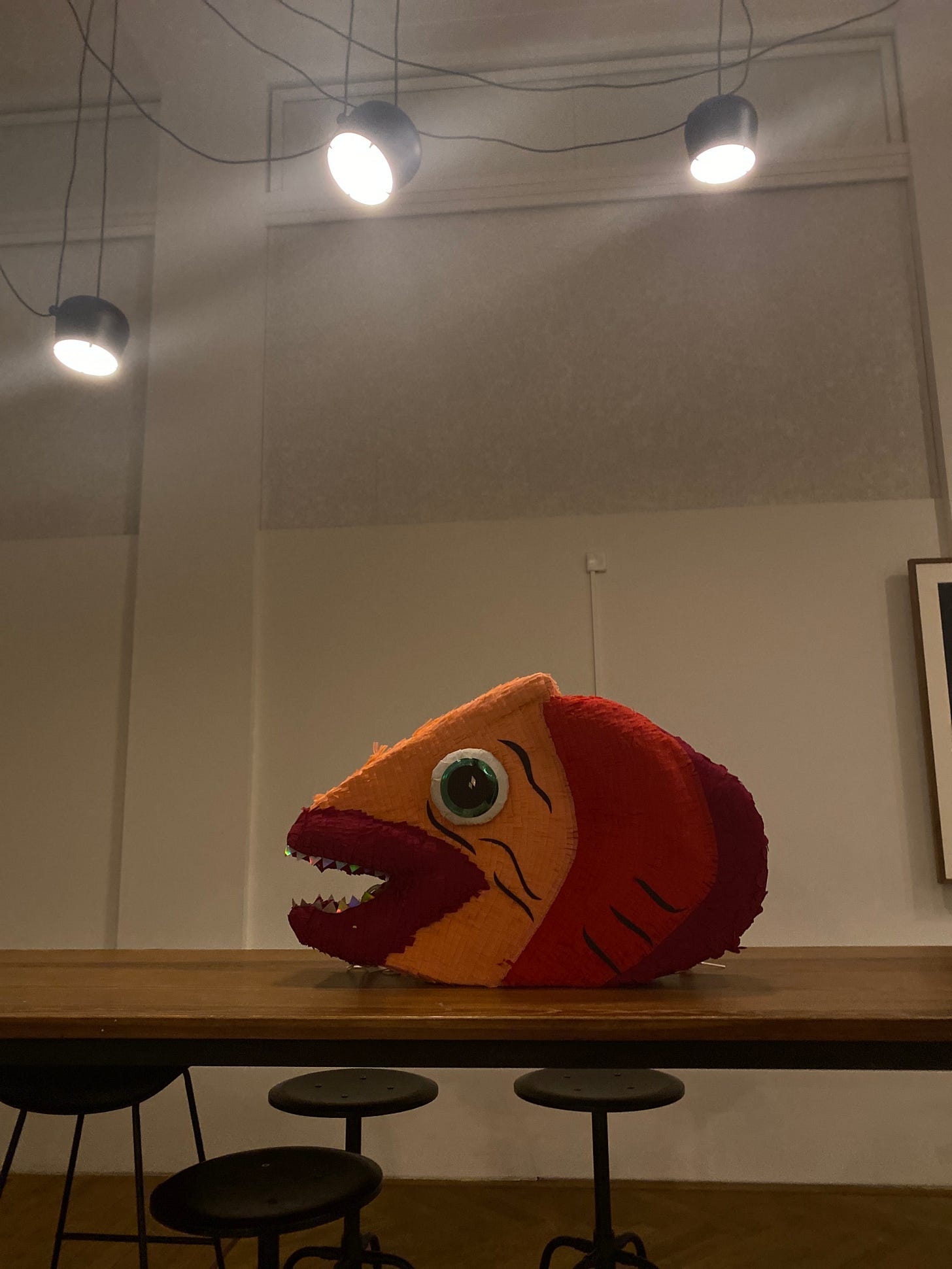A night at the museum. Half the museum was shut but the adjoining restaurant inside had muffled music bouncing off the glass where I saw 5 long tables placed vertically in front. Through the glass and the dim lights, you could see people laughing, kids running around and the un-orderly setting of plates and glasses proved our tardiness.
My family was invited to Gropius Bau’s restaurant named Beba. We weren’t invited by the museum but by my girlfriend’s childhood friend, Rachel who surely had a hand in organising the whole splendid event. The sharing menu was a delight but the company and entertainment made it that unequaled and intimate After all, this was the Jewish New Year, Rosh Hashanah and the year just turned 5784 on September 15th. This was my first time celebrating any year past 2023, and I loved it.
Once we settled in after greetings friends and elders, who tell you they’ve known the mother of your child since she was this little, putting the palm of their hand next to their knee and parallel to their foot with an up and down motion that matches the speed of their bobbing head. All you can do is give back a polite nod and a big smile back and slowly, and wisely, retreat to your seats. We settled in through the lively commotion surrounding us and to who I believe was Peaches, the singer sitting behind us with a wicked leather jacket.
White wine was spread out along plates of round challah bread with coriander chili paste, preserved lemon butter and homemade pickles. The top of the bread had a sticky coating which I presume was honey; it was almost possible to pick up a chunk of bread with just your fingertip, as if a cloud of cotton candy was underneath the crust. A delightful tool to use to scoop the next dish of kohlrabi, celery and apples that had another twist of coriander, chili and lemon — its juices were refreshing and light. It was hard to share.
Sliced apples and honey had been on the table which was only one of the two symbolic foods I recognised besides the fish head I’ll mention later. The apples is the most prominent, which is what we actually ate first to signify having a sweet new year. I’m a romantic and I love symbolism as if my life carried along the knowledge of Robert Langdon from The Da Vinci Code. So I dipped the slice of apple in the honey and fed it to my girlfriend and gave another slice to my daughter, but without the honey. The significance of the apple and honey goes much deeper into Jewish history and religion, but I’ll keep it short to the moment when it was much better explained.
The two hosts; Rachel, and Ariel checked the microphone and let it amplify the beginning of their speech. The apple, the beetroots and the cauliflower were all given their rightful introduction by them. We were told the cauliflower was the youngest domesticated vegetable. The beet root that was served as a carpaccio was talked about deriving from the Sephardic (Jews of Spain) tradition of eating foods for what they represent rather than what they taste like. The beets share the same color as blood, and in Hebrew the word for beets is selek — to remove. To express the hope that your enemies will depart.
This introspection and thought provoking incentive to understand what is being eaten elevated the respect of the whole evening, meal and ingredients. Then came along a Sephardic aubergine salad, a garden salad with pomegranate. A leek confit on top of rich labneh, and fried cauliflower with herb tahini. The appreciation of symbolism made the evening so grandiose, contemplative and respectful. The hosts explained, pomegranate is special for many reason and since the fruit is full of seeds, the hope of full merits will take hold in the new year to come. The leek, or kareyt — meaning to cut, is linked to the prayer of those who wish to hurt will be cut off.
At this point came a fantastic musical interlude that gave pause to all that has been said, eaten and shared. The music started sinister, a bit off-key. With that strange feeling of something not sounding right made you feel uncomfortable and finally grew to a more clear tone, one you could appreciate. It continued to evolve into something beautiful that had me close my eyes as soon as my girlfriend put her arms around my shoulders and gave me a hug. It became a sonic romance. Sounds that elevated our moment into happiness.
Another wave of plates came out after the music. Lebanese styled filled onions in pomegranate molasses, with freekeh, herbs and pine nuts hidden inside of them and the head of mushroom stew cooked in wine, roots and herbs laid delicately on top of a topinambour, sunchokes purée.
Rachel spoke clearly to signify the meaning of these dishes. She quoted her text saying:
“A morel and a chanterelle are as different as a flea and an elephant. Don’t group them together, being they are individual and highly complex.”
That is when they both pointed toward massive piñata. They said in honor of Mexican-American festivity we have the fish head and the tail to entertain us, and the children. The head of fish is meant to arouse us to ask that we better “be the head, and not the tail” of course the kids didn’t patiently wait for the speech to end and went at it while Ariel was holding both piñatas on a big branch over his shoulders.
A poem was recited after the destroyed fish face by Ariel of Pablo Neruda’s “Ode To The Onion.” A wave of memory took me back to my high school recital of a poem by Pablo Neruda I had to learn by heart for Spanish class. After some throat clearing and drooping his shoulders from holding the piñatas, Ariel grabbed the microphone and said:
Onion,
luminous flask,
your beauty formed
petal by petal,
crystal scales expanded you
and in the secrecy of the dark earth
your belly grew round with dew.
Under the earth
the miracle
happened
and when your clumsy
green stem appeared,
and your leaves were born
like swords
in the garden,
the earth heaped up her power
showing your naked transparency,
and as the remote sea
in lifting the breasts of Aphrodite
duplicating the magnolia,
so did the earth
make you,
onion
clear as a planet
and destined
to shine,
constant constellation,
round rose of water,
upon
the table
of the poor.
You make us cry without hurting us.
I have praised everything that exists,
but to me, onion, you are
more beautiful than a bird
of dazzling feathers,
heavenly globe, platinum goblet,
unmoving dance
of the snowy anemone
and the fragrance of the earth lives
in your crystalline nature.
To end the evening and to give such a highlight and thanks to onions and mushrooms and everything in between made me think how we usually take what we eat for granted. The voyage, the life of these vegetables were given a podium that evening. A proper place at the table. I mean, when did you hear about a poem about an onion before eating a gorgeous pomegranate molasses caramelised and glazed onion? This deserved to be eaten in a friggin’ museum! The presentation, the pizazz and its curation was all preordained by a higher power of these two fantastic hosts.
Finally, I overheard Ariel sat in front of our table and shared his saying of “We are but guests on this land, we don’t own anything.” We are just passing by, and we should respect what the world gives us. Understanding this subtle essence of interconnectivity. Of respecting a way of life, food, history, music, the spoken word, poetry, the root of it all — including us. We left with not only with full bellies, but plenty of food for thought. I wish I could write such a splendid poem about onions. Maybe in 20 years time. All I know, for now, I’m a fan of Rosh Hashanah.
Labneh-ly yours,
The Greasy Pen.
Oh! Before I go, I would love your vote on what I should write about next!








Oh really? I wasn’t aware of this. But isn’t it logical, based on your information and my simplistic conclusions; life is so much complicated than that, isn’t it?
Nice to chat with someone like you, sensitive, dramatic and complimenting the old witch on her charm…
Enjoyed the thought behind the food description, just one orthography error that clouded the bright sky:
“Write” not “right”.